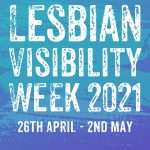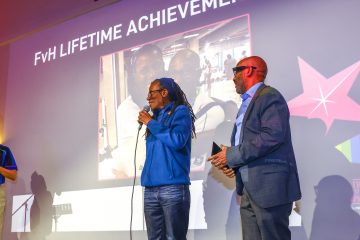‘We should be celebrated – why not!’: Emma Dodds and Becky Morgan – Lesbian Visibility Week Q&A
TV sports reporter Emma Dodds and professional golfer Becky Morgan posted to Instagram about their engagement last year – but they took “different routes” before arriving at their shared happiness. They tell Zoë Vicarage about their journeys and the need to spread a little joy in just being authentic…
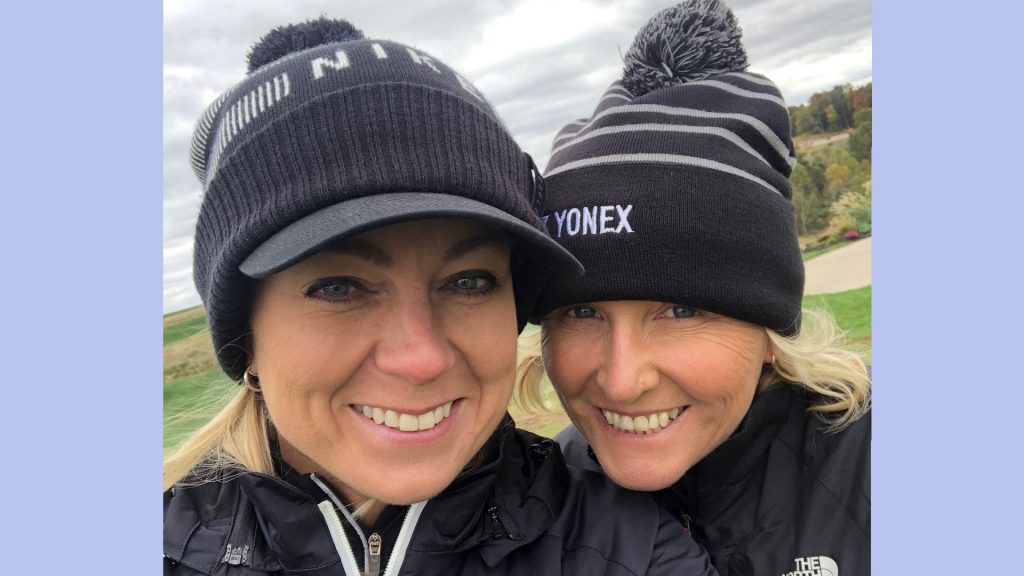
“Supporting LGBTQ+ women to be their true selves at work, at home and socially” – that’s a key objective of Lesbian Visibility Week, and it resonates strongly with Emma Dodds and Becky Morgan.
Emma has become a familiar face to many sports fans through her broadcasting work with BT Sport, Premier Sports and other channels, while her fiancée Becky is a professional golfer with experience on the LPGA Tour and the Ladies European Tour, winning the Hero Indian Women’s Open tournament in 2018.

They announced their engagement via Instagram in September 2020, having celebrated privately with friends and family earlier in the year, at a time when Emma was also hosting the Pride Active Conversations interview series for LEAP Sports Scotland, supported by Sports Media LGBT+ and Pride of the Terraces.
For LVW 2021, I spoke to Emma and Becky about their careers, their relationship, and what being ‘visible’ means for themselves and other LGBTQ+ women in sport…
ZV: Hi Emma and Becky! Thanks for joining us for this chat. Emma, let’s start with your work in the sports media industry. How did that begin and what was your journey?
Emma: I knew at school that I wanted to go into sport, and I had the option to go to the US and play basketball – but I’m probably not the best build to go and make a career out of that! I was doing work experience in local radio and I ended up getting a job at a station in my gap year. I used to do the traffic reports, deliver prizes for the events team, all sorts of nonsense – but I really enjoyed it. At the end of my year, I didn’t want to leave. There were graduates coming in that were shadowing me, so I figured having the job already was better than going to get the qualification.

I moved on to Rangers, and then I took a sideways step and worked for the record label Warner Music in Paris but did a little bit with PSG while I was there. I ended up coming back to the UK and that’s when I really started in TV, as Colin Davidson – who I’d known at Rangers – got me in at Setanta. I went in to be behind the scenes but one Thursday, he said to me ‘on Saturday, I want you to be the pitchside reporter. I didn’t tell you earlier because I knew you’d worry about it but go and do your thing’.
It was the best way it could happen as I didn’t have time to worry. I knew Scottish football anyway and the people involved so it was great. Credit to him for having the faith in me – I think everybody needs that person to give them a step at some point.
Unfortunately, Setanta later went into administration so I moved down to Sky Sports News in Leeds and then London. After that, I went to Dubai to be head of sport for the Arab Media Group – I was the first woman ever to do that role. Obviously, that needed a bit of consideration at the time, going to the Middle East, but I couldn’t speak highly enough of it. It was amazing, one of the best things I’ve ever done – I even got to cover the Melbourne Cup.
I did two-and-a-half years there and came back to work for BT. I know how lucky I am to have this role. I get to meet amazing people and talk to my heroes, basically. A favourite interview was with Dame Kelly Holmes, who I remember watching winning in Athens and screaming at my TV. She was just as cool as you’d imagine her to be and I thought at that point, ‘wow, I love my job’. There are sometimes people like Cristiano Ronaldo and David Beckham too, but I think when you get a footballer who’s that famous, they’re quite protected with what they want to say. With Dame Kelly, she was just so chatty, and it was incredible. Brett Lee was another favourite of mine.
The unusual people that I’ve got to interview are those I’ve found the most satisfying. I like people who want to chat and are not giving you the stock answers.
I heard Steven Gerrard sent you a birthday message recently…
He did, in October! Normally I’d have been working at a Rangers game, but it was my 40th and I took the day off. I’m not often speechless but I wasn’t expecting that! Steven was with Gary McAllister, who I used to work with at BT. It was really nice and, he didn’t reveal how old I was – I suspect he didn’t want to embarrass me!
Having been involved so closely with Rangers, you must be delighted they’ve finally won the league again…
It’s unbelievable. I remember when they went down to the depths of despair. For the people who worked there, lost their jobs, the fans… for everybody, it was such a hard period. To see them come back and end the dominance Celtic had has been amazing to watch. If you’re a fan of football, when you see how much hard work has gone in, you can appreciate what’s happened.
Becky, it’s been a different journey in the world of sport for you. How did you get into golf?
Becky: I started at the age of 12. I have a twin sister and our grandparents took us along to the local golf club, Monmouth GC. I loved it – my sister, not so much! – and I ended up going to university in the States on a golf scholarship. I did four years there, graduated, and came back. I stayed amateur for a couple of years and then I took the plunge to go pro.
Because I loved the States so much from college, I played over there solidly for the first 18 years of my career. In the last two or three years, I’ve come back to the European Tour, partly because I didn’t find myself as competitive in the States as I wanted to be. Even though the European Tour is good, the LPGA is the number one tour to play on. But moving back to the UK has worked out perfectly as I met Emma, and I’ve really enjoyed playing in Europe, probably more than I thought I would.
How much has golf changed in your time playing in it?
It’s so global now. When I was in the States, I just played in the States. We might venture out a couple of times a year to a few Asian events. Now it’s all over the place – the European Tour goes to Australia, China, Dubai, South Africa, Kenya… it’s a lot of travel which you have to enjoy if you want to keep doing it. Fortunately, I do.
Everyone is so good now. There used to be a handful of players that were brilliant but now the strength is so deep. It’s challenging but it’s good to be still involved in.
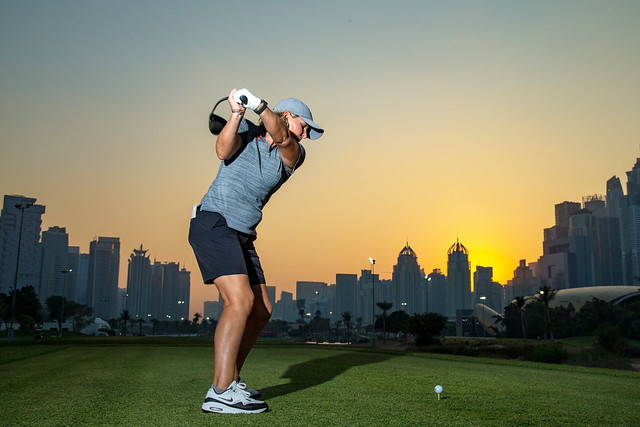
How did the two of you meet and end up getting together?
Emma: We’d met a few times over the years at golf events but at one in particular, I was caddying for a friend who got paired with Becky. Becky’s twin sister was caddying for her and we all just had a hoot.
You’re spending 18 holes a day with someone and then in the confines of the hotel, we’d have dinner together and drinks. We just stayed in touch. It coincided with you [Becky] moving back here…
Becky: It might have played a small part in it – I’ll never tell her that though!
Emma: She realised she couldn’t live without me! Or was it me who realised I couldn’t live without you? It just went from there.
You’re both very visible on Instagram about your relationship. How important do you think that is to other LGBT+ individuals in sport?
Emma: I think it’s really important, I honestly do. Some people feel they have to come out and I probably felt I had to do that more than Becky. It took me a lot longer to say publicly who I was.
I’d always gone to great lengths to keep my private life private because I wasn’t ready. I think part of that was due to the industry I worked in. It wasn’t a case of making a public announcement, like I know some people do, but if you follow me on social media, you’ll know who I am now, and that was after a lot of challenges personally behind the scenes in dealing with my family, and speaking to various people.
For me growing up, there wasn’t that visibility. I didn’t see people who were like me and I often wonder if I did, would it have taken me so long to come out publicly? I don’t think it would have. I grew up in the countryside in Scotland and although I was into sport, I didn’t know of any women who were gay, except for Martina Navratilova who I would look up to. While there were others, I don’t feel it was that well known.
I feel now personally that I want to be visible. I’m comfortable with who I am, and I think there’s a responsibility for us to the younger generation to show it’s OK to be yourself, especially in certain industries.
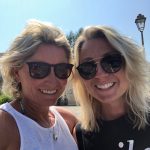
Becky: In golf, it was probably a little easier for me. On tour, you’re just one giant family and most people know people’s business. Everyone knew who was gay and who wasn’t, and I just found it the most normal environment ever.
Aspects of it were trickier, such as trying to get endorsement deals and playing pro-am. I would avoid questions from certain people – I generally don’t answer much about my private life anyway. The first hole, you might be playing with four guys and one would ask, ‘so are you married?’ And I’d reply: ‘No’. That would be the end of the conversation and I wouldn’t elaborate.
Now, it’s changed a lot in the last few years. There are a few girls on tour who are quite visible, such as Mel Reid in America and Beth Allen on the European Tour. Sponsors probably would have been OK with it anyway but there were times in the past when you didn’t want to test that theory. Mel obviously has some pretty good sponsors and that’s helping everyone else to think, ‘if I can be myself, I’m still going to get an endorsement deal out of it’.
Have there been any challenges because of being more open?
Emma: I don’t get a lot of negativity for my sexuality on social media – I get more for being a woman in football than anything else. But I do get messages from youngsters saying, ‘I’m gay and I can’t come out’ or ‘thanks for being open’. I find that really important, even if it just helps one person. I know that’s such a cliche but again, just going back to the original point, I think about if I’d seen that visibility growing up.
I have a lot of friends now who are also lesbians. Seeing them living their lives and the way they socialise and circulate made me more comfortable. I was mid-30s when that ‘comfortable’ moment happened – it took me a lot longer than it should have and now that I’m happy to talk about it, I’m going to.
Was that one of your reasons for taking part in LEAP Sports’ Pride Active Conversations series last year? Did you feel you wanted to share your story to help others?
Emma: I hadn’t really thought about it before. Then I got approached about hosting the series and it really made me consider talking about myself publicly. Becky and I had a conversation about it – I was thinking, ‘is this something I want to do?’ and quickly realising it absolutely was.
The chats with all the guests that came on, I found them so inspiring and educational. Everybody has taken a different path and met challenges – some they’ve overcome, some they’re still facing. I just feel it’s important to have these conversations because nobody should feel alone or different.
Honestly, taking part in that series was one of the most rewarding and fulfilling things I’ve done. That might sound fickle, but I really enjoyed it, having conversations that I’ve never had before. In a world where diversity and inclusion are now such a key part of society, we’ve all got a responsibility to try and lead that.
That ties nicely into Lesbian Visibility Week. How do you view that as an awareness initiative going forward?
Emma: Social media especially puts so many demands on people – we’re all out there painting the perfect life and it’s nonsense. I hate social media as much as I love it, but I think for things like this Week, it’s brilliant. You can communicate with people you’ve never had day-to-day contact with, and you can get a message across and let people know there is a community whether you’re gay or bi, to say that ‘we are here’.
We should be celebrated – why not! I genuinely think it’s a great initiative and there’s so much good work going on across the board.
Becky: Both of our families have been 100 per cent behind us and we’ve not really had any hardships or tough conversations because everyone is so accepting. If knowing that helps anyone go up to their own parents or family members, then that’s great.
Emma: I also think this allows people to tell a story. I was just looking at some of the articles from last year – people who maybe wouldn’t have had the opportunity to discuss certain things that have led them to where they are in their lives.
At the end of the day, everybody knows themselves. We arrived at this point through totally different routes but it’s just about accepting yourself. That’s the first part of it and then knowing that there are so many other people out there like you, and who will be there to support you.
Do you think these weeks have become even more important during the pandemic when we can’t meet as a community?
Becky: We’ve been very fortunate that we live together, and we’ve been able to see each other all the time in the last year or so. But there must be so many girls out there that are struggling with this and have felt like they can’t talk to anyone. Mental health has been a huge issue throughout the pandemic so if you can get online and find something that helps you, it’s huge.
Emma: The LEAP series last year was also about having that interaction too. I imagine there’s a lot of people out there who can’t be themselves under their living conditions or where they’re at.
Emma, there are now several visible LGBTQ+ women in sports broadcasting and it seems very welcoming. How has that come about?
Emma: It’s true, there has been a massive shift. Back when I started, I’d say probably Clare Balding was the only person in my industry that I knew who was out.
When you walked into a press room 20 years ago, generally it was middle-aged white men. Since then, there’s been a massive focus on women in sport initially and that’s led into other forms of diversification which is brilliant. If you’re a young woman coming out of school or university that is gay or bi and who wants to pursue a career in journalism and broadcasting, the doors are open to you completely. It is such a welcoming community.
I’ve worked on productions that have been all women which back when I started out, I would never have thought would happen. We’re moving in the right direction. I want everybody to feel welcome.
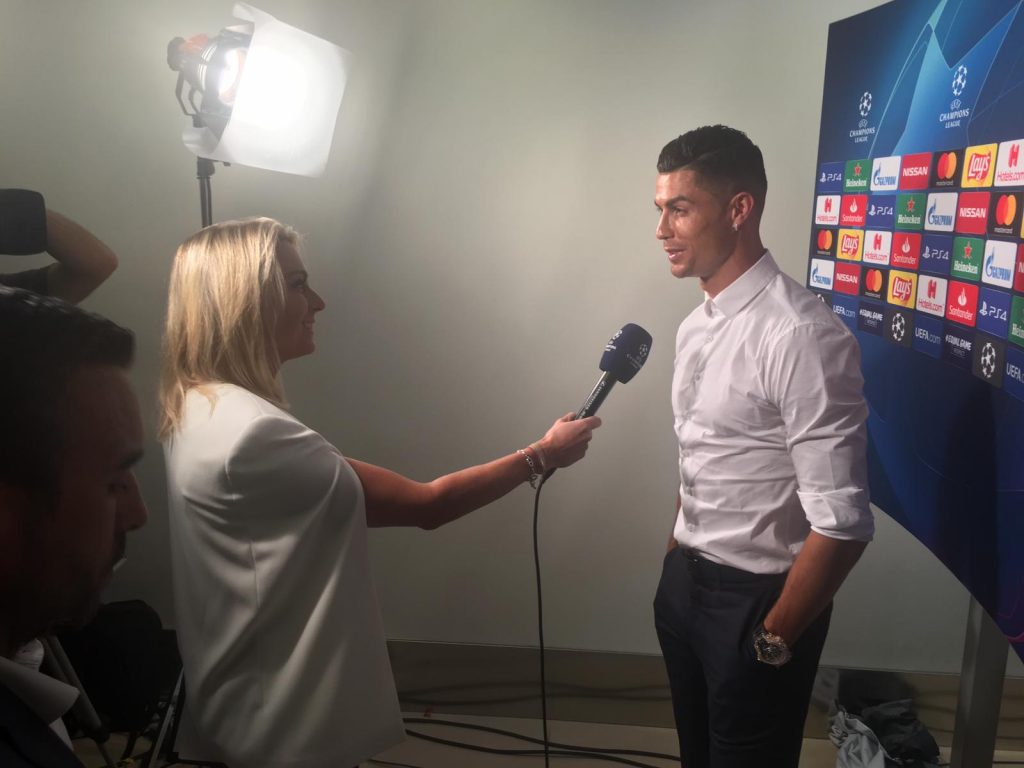
Becky, do you see those shifts in golf as well?
Becky: If you looked back at my social media account back in the day, I would never have put a picture up of myself and my partner. Now, people are just living their true lives on social media rather than putting up some post they think is appropriate for someone else.
The LPGA is doing a great job in the States. It used to always be that they’d do articles on mothers and their kids – that’s fine, it’s amazing that any woman can have a child and play on a professional golf tour – but they’d just tackle that part and completely skip half of the Tour. Now some of the girls on tour who are gay are sharing some of the spotlight and it’s helping their careers massively.
In both of your respective fields, what more can be done to improve awareness about inclusivity and being open about who you are?
Emma: I’d love to see a male professional footballer come out publicly as gay. There aren’t many elite male athletes that are out, and that’s a huge difference between male and female sports.
We have to just keep talking about it and accepting people for who they are. For example, the picture of the two footballers kissing at the 2019 World Cup [Magdalena Eriksson and Pernille Harder] was amazing.
From a broadcasting perspective, I’d like to see more change on screen with the way people look because I do feel there is still a perception of what you should look like on TV. I’ve got an undercut. Would I go on screen with my hair up and with my undercut out? Probably not. More diversification of what women look like might take us forward that little bit further.
Becky: The Tours have finally realised that a huge proportion of the fanbase are gay – for a while, they probably tried to forget about it. Certain events have always had big gay followings. The Tours have now recognised they need to embrace that.
Sports Media LGBT+ is supporting Lesbian Visibility Week and attempting to help raise that awareness. What can we offer?
Emma: The work you guys are doing is incredible. Having a place that is safe and informative and private… it’s a platform I couldn’t really imagine being available when I was younger.
The key word for me is visibility – seeing that people are out there like you.
Becky: I suppose it’s about getting it out to as wide a stretch of people you can. Until you get it into the mainstream media, it’s harder to find resources. Pushing it a little means everybody knows about it rather than people having to try hard just to find information.
Emma: I do often hear people say, ‘why do they need a visibility week’ or ‘why don’t you have a visibility week for middle-aged men?’ Really, if you don’t want to look at it, just don’t pay attention. For people who do want to, it’s important.
Those who don’t want to see it will criticise but the people who are looking for it will get a lot of help from it. Hopefully they can go on to be a part of this group and this community.
I’ve been amazed at how open and welcoming people within this community are. There’s a responsibility to look after and try to take care of each other. That’s something to be celebrated in the world of 2021 with so much chaos going on elsewhere.
Huge thanks from us to Emma and Becky! Learn more about Lesbian Visibility Week on the official website.
Follow Emma on Instagram and Twitter / Follow Becky on Instagram and Twitter
UPDATE: We’re also grateful to Women & Golf for picking up Emma and Becky’s Q&A!
Further reading…
Jo Currie: Lesbian visibility matters in sports media
Sports and thoughts: Six women in sports media share stories for Lesbian Visibility Day
Sports Media LGBT+ is a network, advocacy, and consultancy group that is helping to build a community of LGBT+ people and allies in sport. We’re also a digital publisher. Learn more about us here.
LGBT+ in sports? Your visibility will inspire other people – sharing your story can be hugely rewarding and you don’t have to be famous to make a positive and lasting impact. We encourage you to start a conversation with us, in confidence, and we’ll provide the best advice on navigating the media as part of your journey.
Email jon@sportsmedialgbt.com or send a message anonymously on our Curious Cat.
